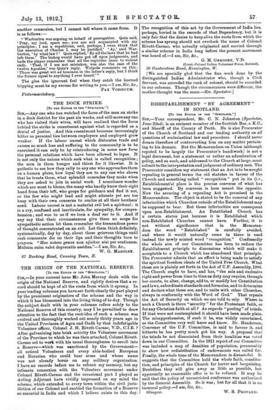THE DOCK STRIKE.
[To THE EDITOR OF THE "SPECTATOR."] SIR,—Any one who has watched the faces of the men on strike in a dock district for the past six weeks, and still more any one who has visited their wives, will have realized that the force behind the strike is resentment against what is regarded as a denial of justice. And this resentment becomes increasingly bitter as personal ties between employers and employed grow weaker. If the labour unrest which dislocates trade and causes so much loss and suffering to the community is to be exorcised it can only be by reintroducing in some new form the personal relations which have been allowed to lapse. It is not only the unions which seek what is called recognition ; the men in them hunger and thirst for it likewise. It is pathetic to see how they rally to any one who approaches them on a human plane, bow loyal they are to any one who shows that he trusts them, what splendid comrades they make when they are asked to join in social work. I sometimes wonder which are most to blame, the many who hardly know their right band from their left, who grope for guidance and find it not, or the few who might lead and might educate yet are too busy with their own concerns to realize at all their brothers' need. Labour unrest is not a material evil but a spiritual : it is a cry, confused and inarticulate, for sympathy, for compre- hension ; and woe to us if we turn a deaf ear to it. And if any say that their circumstances give them no scope for sympathetic action let them remember the tremendous power of thought concentrated on an evil. Let them think definitely, systematically, day by day, about these grievous things until rash comments die on their lips and their thoughts turn to prayers. "Hoc autem genus non ejicitur nisi per orationem. Multum enim valet deprecatio assidua."—I am, Sir, &c.,
87 Barking Road, Canning Town, E.
W. G. MARTLEY.






































 Previous page
Previous page